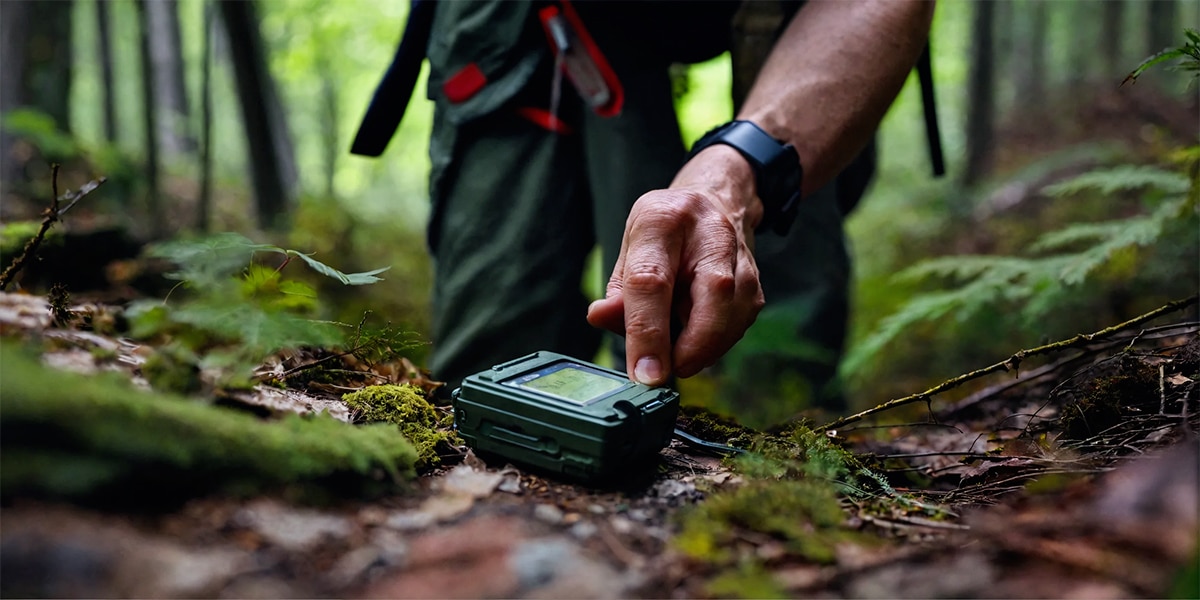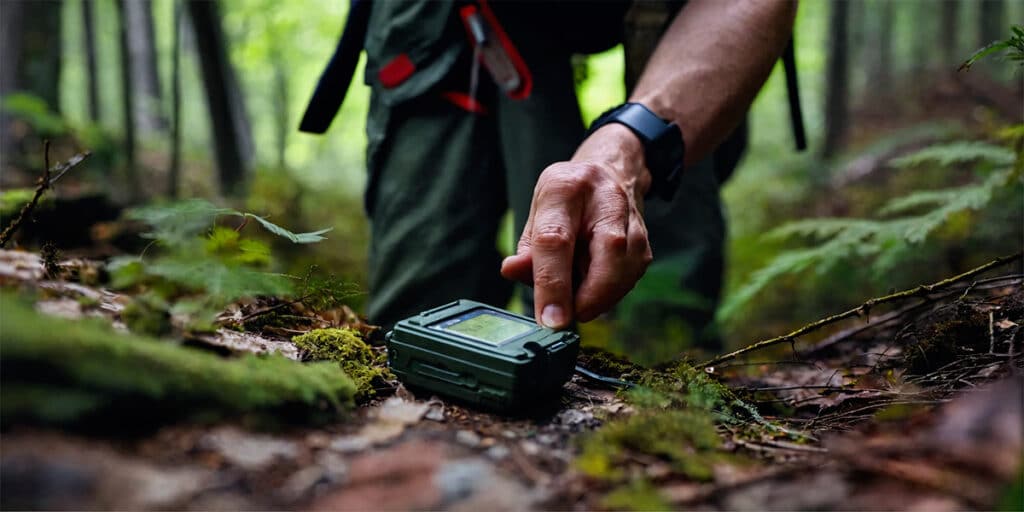In the quest for maintaining a healthy lifestyle, finding activities that are both enjoyable and conducive to managing chronic conditions like diabetes can be a challenge. Geocaching, a treasure-hunting game that involves using GPS devices or smartphone apps to find hidden containers, called “geocaches,” at specific locations marked by coordinates all over the globe, offers an innovative solution.
This blend of adventure and physical activity not only injects fun into regular exercise routines but also provides an opportunity to explore the great outdoors. The twist? Incorporating a diabetes-friendly approach to this popular activity enhances its health benefits, making it an ideal choice for individuals managing diabetes.
The Allure of Geocaching: An Overview
Geocaching is more than just a game; it’s a global phenomenon that encourages exploration, problem-solving, and physical activity. Participants, known as geocachers, embark on a quest to locate hidden caches using GPS coordinates. These caches often contain logbooks for finders to sign, sometimes trinkets for trade, and occasionally, trackable items that travel from cache to cache. The thrill of the hunt and the joy of discovery are what draw millions to participate in this activity worldwide.
A Diabetes-Friendly Adventure
Individuals with diabetes face unique challenges when it comes to managing their condition, especially concerning physical activity and diet. Geocaching, with a diabetes-friendly twist, addresses these challenges head-on. By incorporating specific considerations and modifications, it becomes an enriching experience that contributes positively to diabetes management.
The Benefits of Physical Activity
Regular physical activity is crucial for managing diabetes, as it helps control blood sugar levels, improves insulin sensitivity, and aids in weight management. Geocaching, being an outdoor activity, encourages participants to walk, hike, and sometimes climb, providing a varied physical workout that can easily be adjusted to fit one’s fitness level and capabilities.
- A study published in the “Journal of Physical Activity and Health” highlighted the potential of recreational activities, including geocaching, to significantly increase physical activity levels in participants.
- Geocaching can be particularly beneficial for those looking to break the monotony of traditional exercises. Its adventurous nature keeps participants engaged and motivated to stay active.
Enhancing Mental Health and Well-being
The benefits of geocaching extend beyond physical health, offering significant mental health advantages. Engaging in outdoor activities and connecting with nature have been shown to reduce stress, anxiety, and depression, which are conditions that individuals with diabetes may experience more frequently.
- Research in the “International Journal of Environmental Research and Public Health” suggests that outdoor activities like geocaching can improve mental health by reducing stress and enhancing mood.
- The social aspect of geocaching, involving community events and group hunts, can also contribute to emotional well-being by fostering connections and reducing feelings of isolation.
A Strategy for Balanced Nutrition
Incorporating a diabetes-friendly twist into geocaching involves planning for balanced nutrition during the activity. Packing healthy snacks and hydration that align with diabetes dietary recommendations ensures that blood sugar levels remain stable throughout the adventure.
- Choosing low-glycemic index snacks that provide sustained energy can make the geocaching experience more enjoyable and safe for individuals managing diabetes.
Navigating Geocaching Challenges with Diabetes
While geocaching offers many benefits for individuals with diabetes, it’s important to navigate potential challenges with care. Preparation and awareness can ensure a safe and enjoyable experience.
Planning for Success
Before embarking on a geocaching adventure, thorough planning is essential, especially for individuals managing diabetes. This includes checking the weather forecast to dress appropriately, estimating the duration of the activity to plan for meals or snacks, and familiarizing oneself with the terrain to assess the physical demands.
- Preparing a diabetes management kit with glucose monitoring supplies, emergency snacks, and water can mitigate risks associated with fluctuating blood sugar levels during the activity.
Safety Measures
Safety should always be a priority, particularly when exploring unfamiliar areas. Informing someone about your geocaching plans, including the locations you intend to visit and expected return time, is a prudent safety measure.
- In case of an emergency, having a charged cell phone and knowledge of the nearest medical facilities can provide peace of mind.
| Parameter | Impact | Recommendation |
|---|---|---|
| Physical Activity Level | Increases insulin sensitivity, lowers blood sugar levels | Engage in moderate activity for at least 150 minutes per week |
| Mental Well-being | Reduces stress and anxiety, improves mood | Incorporate outdoor activities into regular routine |
| Blood Sugar Control | Improves with regular physical activity and reduced stress | Monitor blood sugar levels before, during, and after activities |
| Nutritional Balance | Essential for energy and maintaining stable blood sugar levels | Plan and pack diabetes-friendly snacks and hydration |
| Social Interaction | Improves emotional well-being and support | Participate in community events and group activities |
Integrating Technology for Enhanced Experience
Technology plays a central role in geocaching, but its benefits can be further maximized to support a diabetes-friendly approach. Leveraging apps and devices for diabetes management alongside geocaching apps can streamline the experience.
GPS and Geocaching Apps
Choosing the right geocaching app can enhance the adventure by providing detailed information about cache locations, difficulty levels, and terrain, allowing individuals to select caches that match their physical capabilities and interests.
- Some apps also offer features like offline maps and community logs, which can be invaluable for planning in areas with limited cellular reception.
Diabetes Management Apps
Integrating diabetes management apps into the geocaching experience can help individuals monitor their blood sugar levels, track physical activity, and log food intake on the go. These apps can offer reminders to check blood sugar or hydrate, making them a valuable companion on geocaching adventures.
- Selecting apps that allow for easy data sharing with healthcare providers can also facilitate discussions about physical activity and diabetes management.
Geocaching presents a unique opportunity for individuals with diabetes to engage in physical activity, connect with nature, and experience the thrill of treasure hunting, all while managing their condition. By incorporating a diabetes-friendly twist into geocaching, it becomes not just an adventure but a supportive tool for health and well-being.
With careful planning, awareness of safety, and the integration of technology, geocaching can be a rewarding experience for everyone, regardless of their health status. So grab your GPS, pack your diabetes-friendly snacks, and set off on a treasure hunt that promises not just fun, but a step forward in managing diabetes with joy and adventure.
Geocaching with a Diabetes-Friendly Twist: Your FAQs Answered
What is geocaching?
Geocaching is a real-world, outdoor treasure hunting game using GPS-enabled devices. Participants navigate to a specific set of GPS coordinates and then attempt to find the geocache (container) hidden at that location.
How does geocaching benefit people with diabetes?
It encourages physical activity, which is key in managing blood sugar levels and improving insulin sensitivity. It also promotes mental well-being and offers opportunities for social interaction.
What should I bring on a geocaching adventure?
A GPS device or smartphone with a geocaching app, water, healthy snacks, a pen to sign the logbook, and any necessary diabetes supplies.
How can I make geocaching a safe activity for managing my diabetes?
Monitor your blood sugar levels before, during, and after the activity. Carry glucose tablets or snacks to manage low blood sugar levels and stay hydrated.
Can geocaching be done solo or is it a group activity?
Both. You can enjoy geocaching on your own for some solitude or join community events and group hunts for a social experience.
Is geocaching suitable for all fitness levels?
Yes, there are geocaches of all difficulty levels, from easy finds in urban areas to challenging hikes in remote locations. You can choose caches that match your fitness level.
How do I start geocaching?
Create an account on a geocaching website or app, use the search function to find caches near you, and use your GPS device or smartphone to navigate to the cache location.
What kind of snacks are best for a diabetes-friendly geocaching adventure?
Opt for snacks that are low in simple sugars and high in fiber, such as nuts, seeds, whole-grain crackers, and fresh fruit.
Can geocaching help with weight management?
Yes, the physical activity involved in geocaching can contribute to weight loss and maintenance, which is beneficial for diabetes management.
Where can I find more information on geocaching events and communities?
Check the official geocaching website and social media groups for events, community meetups, and tips from experienced geocachers.
Citations
- Colberg, Sheri R., et al. “Physical Activity/Exercise and Diabetes: A Position Statement of the American Diabetes Association.” Diabetes Care 39.11 (2016): 2065-2079. This comprehensive position statement by the American Diabetes Association underscores the critical role of physical activity in managing diabetes, providing evidence-based guidelines and recommendations.
- Berman, Marc G., et al. “The Cognitive Benefits of Interacting With Nature.” Psychological Science 19.12 (2008): 1207-1212. Berman’s study highlights the cognitive and emotional benefits of interacting with natural environments, supporting the mental health advantages of outdoor activities like geocaching.
- Thomas, Diana T., Kelly J. Erdman, and Louise M. Burke. “Position of the Academy of Nutrition and Dietetics, Dietitians of Canada, and the American College of Sports Medicine: Nutrition and Athletic Performance.” Journal of the Academy of Nutrition and Dietetics 116.3 (2016): 501-528. This joint position statement offers detailed nutritional strategies for optimizing athletic performance, relevant to individuals with diabetes engaging in geocaching.
- Seraganian, Peter, et al. “Exercise and Diabetes Mellitus.” Diabetes Care 15.11 (1992): 1797-1807. This study explores the relationship between exercise and its effects on diabetes management, including stress reduction, illustrating the health benefits of regular physical activity for individuals with diabetes.
- Holt-Lunstad, Julianne, Timothy B. Smith, and J. Bradley Layton. “Social Relationships and Mortality Risk: A Meta-analytic Review.” PLOS Medicine 7.7 (2010): e1000316. This meta-analytic review establishes the link between social relationships and mortality risk, emphasizing the importance of community and social engagement in improving health outcomes, which aligns with the social aspect of geocaching.








